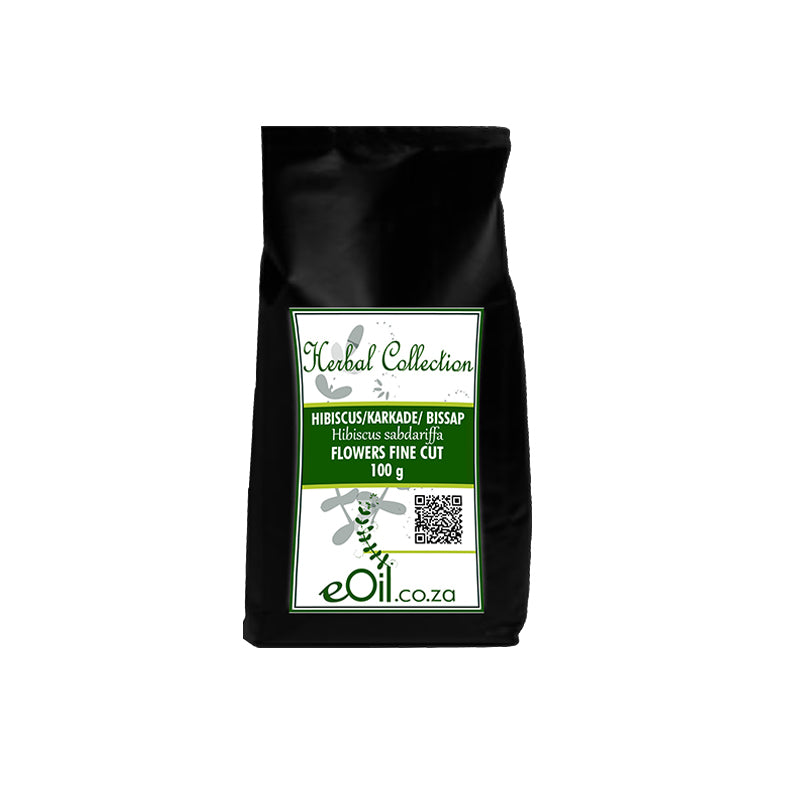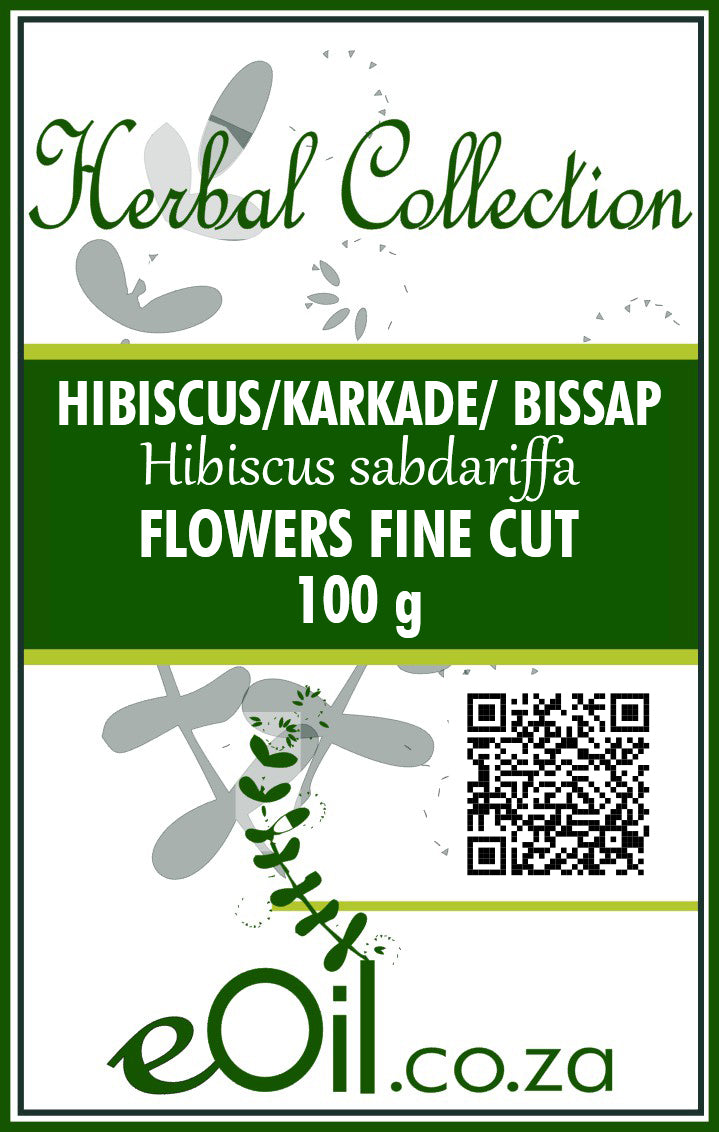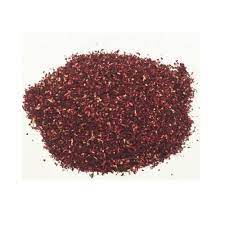Hibiscus TBC fine cut - Herbal Collection
Hibiscus TBC fine cut - Herbal Collection - 100 gr is backordered and will ship as soon as it is back in stock.
Description
Description
Recipe Weigth management - Helps Burn Fat
Hibiscus (Hibiscus sabdariffa) – Dried Petals, Fine Cut Petals, and Powder
TRADITIONALLY USED FOR
What is Hibiscus?
Hibiscus flowers (especially Hibiscus sabdariffa, sometimes called Roselle) are widely used as an herbal tea, tart flavoring, and natural wellness remedy. The dried petals, fine cut, and powder forms all offer the same core benefits and uses, with differences mainly in how easily they dissolve or blend into drinks and foods.
Forms & Preparation
- Dried Petals/Fine Cut: Whole, broken, or finely cut petals for tea/tisane, culinary, or cosmetic use.
- Powder: Ground petals for instant mixing into drinks, foods, or formulations; ideal for smoothies, capsules, and functional beverage brands.
Health & Functional Benefits
- Rich in Antioxidants:
- Contains polyphenols (especially anthocyanins like delphinidin and cyanidin), flavonoids, and vitamin C, which help protect against free radicals and support immune health.
- Supports Heart & Blood Pressure:
- Clinical research shows regular hibiscus tea can lower blood pressure (especially mild-moderate hypertension) and support healthy cholesterol profiles[].
- Promotes Healthy Digestion:
- Traditionally used to gently stimulate digestion, support detoxification, and help soothe the gut.
- Weight Management:
- Some studies suggest potential mild support for healthy metabolism and body composition when combined with diet and exercise.
- Anti-Inflammatory & Immune Support:
- Anthocyanins help modulate inflammatory response and support a healthy immune system[][].
- Hydration and Cooling:
- Commonly brewed as a cooling beverage (hot or iced) ideal for summer or after exercise. Traditional drinks include "zobo" (West Africa), "agua de Jamaica" (Latin America), or hibiscus punch.
How to Use
- Tea/Tisane (all forms):
- Use 1–2 tsp dried or cut petals, or 1 tsp powder per cup.
- Steep in freshly boiled water for 7–15 minutes, strain, and enjoy hot or cold.
- Add spices (cinnamon, ginger, cloves), citrus, or mint to enhance flavor.
- Powder:
- Stir directly into water, juice, smoothies, or yogurt.
- Use in food, baking, natural colorant, capsules, or DIY skin masks.
- Dose: 1–2 tsp (2–4 grams) per serving, not exceeding about 10 g/day for general wellness.
Quality & Certification
- Food grade and vegan (no animal derivatives).
- Free from additives, artificial colors, and fillers.
- Often suitable for kosher, halaal, organic, and gluten-free diets (check label for certification).
Safety & Precautions
- Generally safe as a food and daily herbal tea for most adults.
- Avoid excessive use during pregnancy: Large doses may not be recommended as hibiscus can stimulate uterine activity in animal studies (culinary doses generally regarded as safe).
- May interact with some diuretics, antihypertensive drugs—consult your doctor if using prescription medication.
- Rarely, mild digestive upset may occur, especially at high doses.
Key Actives & Nutritional Value
- Anthocyanins (delphinidin, cyanidin) – primary antioxidants, responsible for color and many health benefits.
- Vitamin C: Varies by processing but adds to immune support.
- Fruit Acids: Citric, malic, and tartaric acid—give hibiscus its tart flavor and support digestive wellness.
- Trace minerals: Calcium, magnesium, potassium.
Table Summary
| Form | Key Uses | Main Actives | Daily Dose | Certification |
|---|---|---|---|---|
| Petals, Fine Cut, Powder | Tea/tisane, cold drinks, culinary, cosmetics, capsules | Anthocyanins, vitamin C, fruit acids | 1–2 tsp/cup, 1–3x/day | Vegan, food grade, COA |
Hibiscus is an herbal supplement and tea, not a drug. Consult a health professional if you have blood pressure, kidney, or medication concerns.
INFORMATION
Source : http://www.wikiphyto.org/wiki/Karkade
Reference on http://www.wikiphyto.org
Translation in English by Google Translate (go to the page of the source linked | on Chrome cellphones go on the 3 dots on the top right and select translate in your preferred language | on laptop right click your mouse and select option translate when hoovering on the page
plant name
Karkadé, Hibiscus , Rose tea , Empire tea , Guinea sorrel , Guinea red sorrel , bissap (vernacular name)
International Latin denomination
Hibiscus sabdariffa L. var. ruber
botanical family
Malvaceae
Description and habitat
- Subshrub with large isolated leaves, long petiolate and lobed
- Flowers with calyx with 5 linear petals and very divided calyx, which becomes red and fleshy, surrounds the ovary and persists while the petals disappear after desiccation
History and tradition
- Originally from Angola, cultivated worldwide in tropical regions (Sudan, Egypt, Thailand, Mexico, China)
- The K'iché Maya of Guatemala use it to cure measles.
- Used as an antibacterial in traditional African medicine
Parts used
- Flower: calyx and calycle dry
Dosage forms available
- Tisane
Usual dosages
Composition
Main components of the plant
- Organic acids (15-30%): citric acid , malic acid , tartaric acid , oxalic acid , allohydroxycitric acid lactone (drug specific), ascorbic acid (vit. C)
- Anthocyanosides (1.5%): delphinidol-3-sambubioside , delphinidol-3-glucoside , delphinidin , cyanidol-3-sambubioside (giving a wine-red color to the infusion)
- Flavonoids : gossypetin 3-glucoside (= 3,5,7,8,3,'4'-hexahydroxy flavone )
- Polysaccharides , mucilages , pectins
- Phytosterols
Main components of buds or young shoots
Main components of essential oil
Properties
Plant properties
- Refreshing drink, mild laxative in large quantities
- Antibacterial by gossypetin [1] , [2] , in the traditional medicine of Mali it is associated in the treatment of cystitis [3]
- Anti-inflammatory [4] and analgesic [5]
- Smooth muscle antispasmodic (rabbit aorta, rat uterus, guinea pig trachea, rat diaphragm) [6] , uterine muscle relaxant
- Diuretic, natriuretic, potassium-sparing by modulation of aldosterone activity [7] and presumably by release of nitric oxide, leading to relaxation of the renal vascular endothelium and improved renal filtration [8]
- Hypotensive by inhibition effect of angiotensin converting enzyme (IEC) by flavones and anthocyanins [9] , [10] , [11] , [12] , [13] , [14] , [ 15] , [16]
- Cholesterol lowering (especially leaf) [17] , [18]
- Cholagogue, anthelmintic
- Antiphlogistic and anti-edematous for external use ( mucilages )
- The leaves of Hibiscus cannabins protect the liver against hepatotoxic (aqueous extract)
Bud properties
Properties of essential oil
Directions
Indications of the whole plant (phytotherapy)
- Weeping eczema
- allergies
- Colds, inflammation of the upper respiratory tract
- Colibacillosis, urinary tract infections, renal failure
- High blood pressure
- Metabolic syndrome: morning and evening herbal tea for 21 days induces decreased weight, blood pressure, fasting blood sugar, improved lipid profile, increased nitric oxide concentrations and decreased cortisol in women elderly [19]
Indications of the bud (gemmotherapy)
Specific indications of essential oil (aromatherapy)
Known or suspected mode of action
- Fruit acids are responsible for the pleasant tart flavor
- The mild laxative effect is also due to poorly absorbable acids
- Modulation of aldosterone activity, inhibition of angiotensin converting enzyme (ACE), renal nitric oxide release
Usual formulations
Regulations
- French Pharmacopoeia list A (calyx and calyx)
Possible side effects and precautions for use
Bibliographic references
- Aller↑ Mounnissamy VM, Kavimani S, Gunasegaran R. Antibacterial activity of gossypetin isolated from hibiscus sabdariffa. The Antiseptic. 2002 Mar; 99(3): 81-2
- Aller↑ Kristen L. Higginbotham, Kellie P. Burris, Svetlana Zivanovic, P. Michael Davidson, C. Neal Stewart, Jr. Antimicrobial Activity of Hibiscus sabdariffa Aqueous Extracts against Escherichia coli O157:H7 and Staphylococcus aureus in a Microbiological Medium and Milk of Various Fat Concentrations. Journal of Food Protection, Vol. 77, No. 2, 2014, Pages 262–268 doi:10.4315/0362-028X.JFP-13-313 full text
- Aller↑ Sanogo Rokia, Diallo Drissa, Diarra Seydou, Ekoumou Colette, Bougoudogo Flabou. Antibacterial and analgesic activity of two traditional recipes used in the treatment of urinary tract infections and cystitis in Mali. Mali Medical 2006, T XXI, No. 1 [1]
- Aller↑ Kao ES, Hsu JD, Wang CJ, Yang SH, Cheng SY, Lee HJ. Polyphenols extracted from Hibiscus sabdariffa L. inhibited lipopolysaccharide-induced inflammation by improving antioxidative conditions and regulating cyclooxygenase-2 expression. Biosci Biotechnol Biochem. 2009 Feb;73(2):385-90. Epub 2009 Feb 7. PMID 19202285
- Aller↑ Akkol EK, Yeşilada E, Güvenç A. Valuation of anti-inflammatory and antinociceptive activities of Erica species native to Turkey. J Ethnopharmacol. 2008 Mar 5;116(2):251-7. PMID 18164152
- Aller↑ Ali MB, Salih WM, Mohamed AH, Homeida AM. Investigation of the antispasmodic potential of Hibiscus sabdariffa calyces. J Ethnopharmacol. 1991 Feb;31(2):249-57. PMID 2023432
- Aller↑ Jiménez-Ferrer E, Alarcón-Alonso J, Aguilar-Rojas A, Zamilpa A, Jiménez-Ferrer CI, Tortoriello J, Herrera-Ruiz M. Diuretic effect of compounds from Hibiscus sabdariffa by modulation of the aldosterone activity. PlantaMed. 2012 Dec;78(18):1893-8. doi: 10.1055/s-0032-1327864. PMID 23150077
- Aller↑ Alarcón-Alonso J, Zamilpa A, Aguilar FA, Herrera-Ruiz M, Tortoriello J, Jimenez-Ferrer E. Pharmacological characterization of the diuretic effect of Hibiscus sabdariffa Linn (Malvaceae) extract. J Ethnopharmacol. 2012 Feb 15;139(3):751-6. doi: 10.1016/j.jep.2011.12.005. PMID 22178178
- Aller↑ Ojeda D, Jiménez-Ferrer E, Zamilpa A, Herrera-Arellano A, Tortoriello J, Alvarez L. Inhibition of angiotensin convertin enzyme (ACE) activity by the anthocyanins delphinidin- and cyanidin-3-O-sambubiosides from Hibiscus sabdariffa. J Ethnopharmacol. 2010 Jan 8;127(1):7-10. PMID 19808084
- Aller↑ Deyanira Ojeda, Enrique Jiménez-Ferrer, Alejandro Zamilpa, Armando Herrera-Arellano, Jaime Tortoriello, Laura Alvarez. Inhibition of angiotensin convertin enzyme (ACE) activity by the anthocyanins delphinidin- and cyanidin-3-O-sambubiosides from Hibiscus sabdariffa. Journal of Ethnopharmacology 127 (2010) 7–10 [2]
- Aller↑ Jonadet M, Bastide J, Bastide P, Boyer B, Carnat AP, Lamaison JL. In vitro enzyme inhibitory and in vivo cardioprotective activities of hibiscus (Hibiscus sabdariffa L.). J Pharm Belgium. 1990 Mar-Apr;45(2):120-4. PMID 2355305
- Aller↑ Seck, SM, Diop, AE, Ka, FE, Doupa, D., Diouf, B., & Gueye, L. (2016, May). Antihypertensive efficacy of Combretum micranthum and Hibiscus sabdariffa: a randomized controlled trial versus ramipril. In NEPHROLOGY DIALYSIS TRANSPLANTATION (Vol. 31, pp. 120-120). GREAT CLARENDON ST, OXFORD OX2 6DP, ENGLAND: OXFORD UNIV PRESS.
- Aller↑ Seck SM, Doupa D, Dia DG, Diop EA, Ardiet DL, Nogueira RC, Graz B, Diouf B. Clinical efficacy of African traditional medicines in hypertension: A randomized controlled trial with Combretum micranthum and Hibiscus sabdariffa. J Hum Hypertens. 2017 Dec;32(1):75-81. doi: 10.1038/s41371-017-0001-6. PMID 29311704
- Aller↑ Serban C, Sahebkar A, Ursoniu S, Andrica F, Banach M. Effect of sour tea (Hibiscus sabdariffa L.) on arterial hypertension: a systematic review and meta-analysis of randomized controlled trials. J Hypertens. 2015 Jun;33(6):1119-27. doi: 10.1097/HJH.0000000000000585. PMID 25875025
- Aller↑ Mozaffari-Khosravi H, Jalali-Khanabadi BA, Afkhami-Ardekani M, Fatehi F, Noori-Shadkam M. The effects of sour tea (Hibiscus sabdariffa) on hypertension in patients with type II diabetes. J Hum Hypertens. 2009;23:48–54.
- Aller↑ McKay DL, Chen CY, Saltzman E, Blumberg JB. Hibiscus sabdariffa L. tea (tisane) lowers blood pressure in prehypertensive and mildly hypertensive adults. J Nutr. 2010 Feb;140(2):298-303. doi: 10.3945/jn.109.115097. PMID 20018807
- Aller↑ Kuriyan R, Kumar DR, RR, Kurpad AV. An evaluation of the hypolipidemic effect of an extract of Hibiscus Sabdariffa leaves in hyperlipidemic Indians: a double blind, placebo controlled trial. BMC Complementary and Alternative Medicine 2010, 10:27 (17 June 2010) [3]
- Aller↑ el-Saadany SS, Sitohy MZ, Labib SM, el-Massry RA. Biochemical dynamics and hypocholesterolemic action of Hibiscus sabdariffa (Karkade). Nahrung. 1991;35(6):567-76. PMID 1787844
- Aller↑ YUSNI, Yusni and MEUTIA, Firdalena. Action Mechanism of Rosella (Hibiscus sabdariffa L.) Used to Treat Metabolic Syndrome in Elderly Women. Evidence-Based Complementary and Alternative Medicine, 2020, vol. 2020. full text
- Wichtl Max, Anton Robert. Therapeutic plants: Tradition, officinal practice, science and therapy. Ed. Tec & Doc. Cachan. 1999. p. 268
- Boulard Bernard. Medicinal plants of the world. Ed. ESTEM. 2001. p. 268
CAUTION
Store in a cool, dry place, away from light. Keep tightly closed, away from the reach of Children and pets.
Do not exceed the daily dose.
This product is not intended to prevent or cure any form of illness or disease.
If you are pregnant or nursing ; If you have a medical condition or are in the course of medical treatment ; If you are programmed for theater/operation in the near future, please consult your healthcare practitioner before using this product.
This product cannot replace a varied and balanced diet and a healthy lifestyle.
This product has not been evaluated by the SAHPRA for its quality, safety or intended use.
For More Information please check our General Safety Herbal products Page

Hibiscus TBC fine cut - Herbal Collection - 100 gr is backordered and will ship as soon as it is back in stock.






